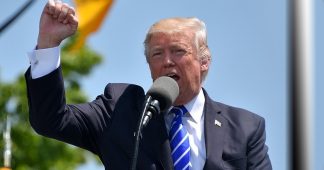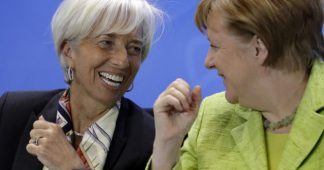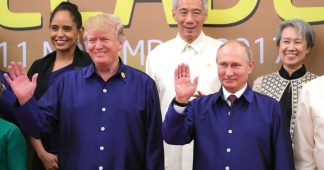By Vinod Saighal
July 5, 2018
Based on reactions from around the world it would appear to be so. More so with the latest sanctions imposed on Russia and Iran by President Donald Trump whose decisions that have global import are coming out fast and furious often without due diligence by the institutions in place for expert analyses. Mr Trump evidently thinks nothing of sidelining them. The much-respected former Secretary of State, Rex Tillerson is a case in point. There are several other examples.
Since the end of World War II American governments have generally been able to impose their will. All through the period between 1945 till about 1990 that saw the demise of the Soviet Union some check had been kept on US unilateralism. Since the coming down of the Berlin Wall the US has had free run till the present day, except in some rare cases. It coincided with the US unipolar moment which could have continued much longer had it not been overtaken by hubris.
Afghanistan was followed by the disastrous war in Iraq. In fact, the quick victory in Iraq to begin with almost led the US to knock out the two so-called rogue states, as designated by them, Syria and Iran. The later reverses in Iraq saved these two countries. Surprisingly US allies with some exceptions remained on board throughout the period. In spite of China’s rise and the resurgence of Russia under Vladimir Putin, the US continued to largely have its way in the global arena.
The advent of Trump changed everything – within America and without. Understandably, as is generally the case, leaders around the world waited for the first hundred days to see which way the new president would go in spite of erratic behavior that was manifest from almost the first day. They did not have to wait long to realise that they were dealing with a president who was not interested in maintaining the tenuous global equilibrium that had held until his ascent to the White House. In a very short while the incoming President has been able to surprise friend and foe.
By walking out of global protocols almost invariably put in place painstakingly by past US Presidents he has brought in a measure of global uncertainty that does not bode well for the US or the world. In a whimsical manner he is going about wrecking the rules-based global order. It was this global order that had allowed the US to hold sway as primus inter pares even after other powers had shown that they had become global heavyweights in their own right.
The sad part for the US and its future standing in the world regardless of whether Trump gets a second term or not is that he is well on the way to scuttling US might and standing in the world. He feels that the US is still the pre-eminent military power in the world. He is not wrong in this. The realisation will come to him when it would be too late that the US could not have held sway across the world – militarily or in world bodies that it dominated – for so long without its allies.
Even during the Cold War where would it have been without its allies? True it was responsible for putting Western Europe on its feet through the Marshall Plan. But even after they were on their feet they continued to be steadfast US allies regardless of whether US policies were good for them or the world.
The same goes for the old Anglo-Saxon order. The US could always count on the support of Canada, Australia, New Zealand, besides the abiding Anglo-American entente that never failed to deliver. Japan, South Korea, the Philippines, Singapore, Thailand to whom the US provided security, to begin with against the Soviet Union, have provided the East and South Asian anchors to the US alliance. Without the support of these allies the US could not have remained the ranking global power for so long. Today, it is these very allies that have the most serious doubts as to where the US leader is taking them and the world order.
Both Japan and Western Europe have been the pillars of US military might. Today Trump is taking the wrecking ball to them. Europe has expressed its misgivings in no uncertain terms. Japan has begun to have its doubts. The Philippine President seems to have walked out, although the military is guarded in its approach. India, another major power on its way up while attempting bravely to guard its strategic independence which seemed to be moving in the direction of the US while not formally aligning itself with it has been put in a quandary. For the US, India has to be the pivot of the Asia-Pacific or India-Pacific maritime freedom of navigation.
Unless there is a major turn in Trump’s policies that have global impact most if not all of the close US allies enumerated above could start gradually distancing themselves. To begin with economic policies; and at some stage with the time-tested but fraying military alliance as well. Turkey is well on the way to spinning out of the Western military alliance. The economic alliance remains tattered in any case. It has no interest in taking the side of the US against Russia, the main reason for it joining the NATO Alliance after World War II. Trump’s habit of name calling leaders will hasten the demise.
The world has gone along with North Korean sanctions and the several UN-mandated sanctions largely pushed through by US and its allies. Coming to the latest US sanctions, first on Russia and then Iran, signs have started appearing that allies and opponents could be ready to break away from the US fold in both cases. The threat of US government action against governments and private entities breaking the sanctions has held firm to date with judicious exclusions from time to time.
The time may have come for the sanctions against these countries to be undermined as the vital economic interest of several US allies and many others who went along are being severely compromised. They might be obliged to break the sanctions, secure in the knowledge that once the floodgates are opened many other nations would be obliged to join in as well, thus rendering the sanctions meaningless and in the process dealing a body blow to the US’s ability to continue to impose sanctions globally.
Taking the case of Russia first what have US sanctions achieved? True they have caused considerable economic pain to the country. Where does the US hope to go from there? What have they lost in the bargain? They certainly have pushed Russia towards China and thereby considerably boosted the latter’s ability to stand up to the US. They have alienated important EU allies including Germany and France among others who have never been comfortable with the sanctions on Russia.
A time could come when they might feel obliged to break away and follow an independent economic policy with Russia. Nor are many other countries including India happy with the sanctions.
It would be worth examining the genesis of the sanctions. They are related to Russia’s annexation of Crimea and the ongoing tension in Eastern Ukraine. It would be recalled that had the West not interfered in Ukraine and attempted to bring it into the Western fold including at some stage NATO, Russia would have had no excuse to act as it did. It felt that its military position would have become immeasurably more vulnerable in the process.
Whether it could have handled the situation differently remains in the realm of speculation. Even now were the EU, even without the US to give guarantees to Russia that its offer to Ukraine to join the EU stands withdrawn and would not be changed in future the situation in Ukraine could to a large extent brought under control. Meanwhile, the sanctions require to be rejected by the EU, France and Germany to begin with as well as India and several other countries not comfortable with them.
In the case of Iran, Trump’s decision to walk out of the deal largely fathered by his predecessor (P5 plus Germany) and re-impose stiffer sanctions do not find any sympathisers among the remaining signatories. They have gone to the extent of assuring the Iranian President that they stand committed to the deal.
Therefore, Trump’s threat could soon become unenforceable when China and India realising that their economic interests could be severely threatened, decide not to honour them, thus dealing the final blow to the US regime of unilateral sanctions. While Japan and a few other countries drawing oil from Iran may not come out in the open they would soon join those countries continuing to deal with Iran.
As far as India is concerned its position is severely compromised by sanctions against both Russia and Iran. It has no choice but to come out openly and make its stand clear because otherwise it will stand out as pariah, not being able to show its face to anyone as the unilateral sanctions regime will soon no longer be tenable or enforceable in the global interest in preserving the rules-based global order. Rather than be obliged to join the countries opposing the US decisions reluctantly after the fact, it should make it clear to the US without fanfare that India would not be in a position to go along. A similar decision should be privately conveyed to Iran.
In the ultimate analysis it is not in the global interest to see a catastrophic decline in US standing in the world simply on account of a President who is not able to behave rationally with either his own people or with countries around the world. The looming planetary decline and pressing decisions necessary to restore the geopolitical equipoise rapidly going out of control will continue to necessitate the presence of the US at the helm of world affairs. Neither its allies nor the major world players including Russia, China and India would wish that the US be obliged to go into isolation.
The writer is Executive Director, Eco Monitors Society and author, Third Millennium Equipoise.
Published at https://www.thestatesman.com/opinion/us-sanctions-now-rogue-process-1502657340.html











